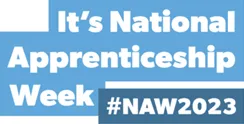Book on One of Our Upcoming Events

National Apprenticeship Week
“ Adapt a growth mindset; Protect your apprenticeship time; and Remember to look wide when you are thinking about your workplace experiences .” - Pam Molyneux
The purpose of the week is to shine a light on the positive impact apprenticeships have on individuals and businesses.
The theme this year is "skills for life", reflecting on how apprenticeships help individuals enhance the knowledge, skills and behaviours for a enriched career. Equally for the employer, the opportunity to support the development of a higher skilled team.
Coming up to my second year in the apprenticeship world, I absolutely love it and continue to say I have the bug!
As a coach supporting CIPD and ILM professionals on their apprenticeship journey, it is so rewarding and fulfilling to see the development progression of an individual in relation to their competence and technical abilities. Although I do feel the real magic and reward is to see the confidence growth - to see the passion for learning flourish and the courage to move personal development forward is just amazing.
I wanted to share 5 top tips that I hope you will get some benefit from:
For apprentices:
1. Adapt a growth mindset – this is usually one of the first activities you will do when you start you apprenticeship programme and it is so important to keep checking in that you are adapting this approach throughout – your coach will help with this also. Doing so will help when it is tough - you are busy in work, you have life to contend with and then your apprenticeship too!
2. Protect your apprenticeship time – it’s too easy to say I will just pop into / onto that meeting, before you know it the time has gone and some how you have to find time to complete the work – your wellbeing comes first and you must get the support you need.
3. Bitesize chunks is a really good way to work through your weekly learning activities – remember the Pomodoro technique in which you work for around 25 minutes, take a 5 minute break, repeat that cycle 4 times and then take a longer break during which making sure you get away properly from your workstation - try and get outside, do some stretching, go for a walk.
4. Remember to look wide when you are thinking about your workplace experiences – it doesn’t always have to be something brand new, it can be an activity you have done previously and whilst on the surface this may look like you will have limited learnings from the situation, look at it from a different angle – did you experience a good refresher, what impact did you have on someone you might be coaching e.g. a manager, how did you feel this time round, what can you share with your team now as a result of the refresher that you might not have been able to the first time.
5. When you are preparing your Unit assessment:
a. look at the assessment criteria ‘command’ word as this will start you off in the right direction,
b. then break down the overall wordcount by each assessment criteria and this gives you a rough guide as to how many words you should be writing for each
c. review the high pass criteria before the submit – go for the stars, there really isn’t that much difference between a pass and high pass!
For managers manging apprentices:
1. Help your apprentice achieve their weekly time allocation – whilst they may be responsible for managing their own calendars, they still have an overwhelming desire to keep things ticking over whilst they step away each week to complete their apprenticeship and before they know it, their weekly time has gone, and they can end up working at night and weekend.
2. Help your apprentice to embed their learning regularly – find out what they have learned over this last unit and identify opportunities in which they can transfer that learning into a work based scenario, invite them to share their learning with the team and give them feedback on such.
3. Attend the quarterly progress reviews as this is a brilliant opportunity to see how much work is being undertaken and how they are progressing. It is an opportunity for you to celebrate with them their journey and to address any concerns and agree an action plan to get things back on track.
4. Get to know the standards they are working to as this will make it easier when the End Point Assessment comes, and you become the ‘segregate’ coach! You reading their consultative project and being a sounding board for their professional discussion, will really add value to their preparation!
5. Agree a work-based project that plays to the apprentices strengths – the more they enjoy it, the more they will excel when it comes writing up their consultative project, the more they will excel in implementing it in the workplace which is of benefit to everyone.
Congratulations to everyone who is working through an apprenticeship at the moment and to the managers supporting them.
Ask for help from the support group around you, from your coach, from your tutor, from your manager, from your safeguarding lead.
Celebrate your progress and your efforts regularly!
If you are looking for inspiration, head on over to: https://www.apprenticeships.gov.uk/influencers/national-apprenticeship-week


